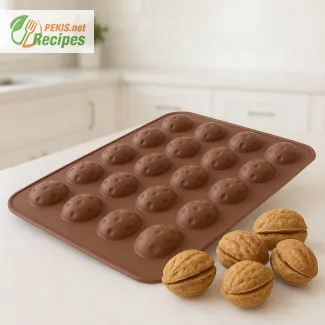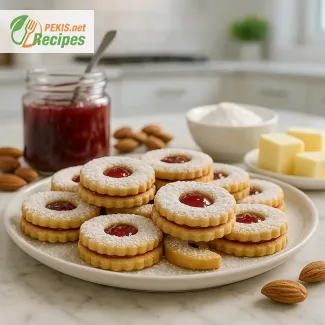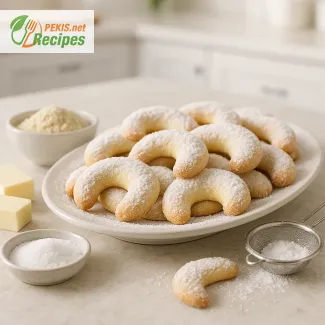A crisp, golden shell gives way to a silky pistachio-ricotta filling that captures the heart of Sicily in every bite. Sicilian pistachio cannoli filled with creamy ricotta delight combine roasted pistachios, citrus notes, and smooth, lush texture with the iconic crunch of freshly fried shells — a dessert rooted in tradition and pure indulgence.
Refining Sicilian desserts over the years has shown how much texture balance matters, especially when working with crisp pastry and creamy fillings. One small adjustment—straining ricotta longer than expected—can completely transform the smoothness of the final bite.
PEKIS – professional chef and recipe developer with over 25 years of experience in cooking and baking, specialized in European and international cuisine.

Decadent Sicilian Pastry Filled with Pistachio and Velvet-Smooth Ricotta
A rich, textured journey into Sicily’s most adored pistachio-kissed dessert
The first bite releases a crisp, golden shell that gently shatters before melting into a lush, velvety ricotta cream scented with pistachio. There’s a spark of excitement in the contrast alone—crunch against silkiness, sweetness wrapped in deep roasted nut aromas. Sicilian cannoli have that magnetic pull where fragrance, texture, and tradition blend into something irresistible. Moments like breaking open a perfectly filled cannolo echo old Sicilian streets, small family pastry shops, and the pride that surrounds this treasured dessert. The pistachio variation elevates these pastries further, adding buttery, earthy richness that lingers pleasantly on the palate.
Across Sicily, cannoli have long symbolized celebration. Their origins are traced back to the Arab influence on the island, when sweetened ricotta, spices, and nuts shaped the future of local pastry culture. Over time, each region developed unique touches—some prefer chunkier fillings, others sweeten the ricotta more boldly. The pistachio-centric style, especially popular near Bronte where some of the world’s finest pistachios grow, delivers an unmistakably luxurious flavor and a naturally vibrant green hue. This interpretation taps into that legacy but keeps a modern sensibility with texture contrasts, clean sweetness, and a balanced finish.
Ingredient character and how each element shapes the dessert
The crisp shell relies on proper frying for its signature bubbled surface and light snap, helping it stay structured against the creamy center. Ricotta gives the filling body, richness, and a natural sweetness that isn’t overwhelming. Pistachios introduce color, fragrance, and depth—finely ground nuts create smoothness, while coarsely chopped ones add small bursts of crunchy contrast. A touch of citrus zest brightens the cream, while powdered sugar weaves everything together with delicate softness. Depending on style, a hint of vanilla or orange blossom water can round out the aroma.
If creamy pistachio desserts appeal to you, there is also a pistachio frozen treat available as Pistachio Semifreddo with Crunchy Center – Classic Italian Frozen Dessert. It offers a different take on the same nutty flavor profile yet keeps that indulgent Italian spirit alive.
Storage and make-ahead guidance
Cannoli shells can be prepared ahead of time and stored unfilled; keeping them away from moisture preserves their crisp structure. The pistachio-ricotta filling benefits from a short rest in the refrigerator to allow flavors to meld. Once filled, they are best enjoyed within hours to maintain the ideal texture. If preparing in advance, keep the shells and cream separate until just before serving.
Flavor-entity insights: pistachio, ricotta, citrus zest, cannoli shells
This dessert stands at the crossroads of nutty depth, creamy balance, and fried-pastry crispness. The interplay between roasted pistachio oils and ricotta’s soft dairy notes creates a flavor base that’s both comforting and elevated. Aromatic accents like citrus or vanilla enhance the complexity but never overshadow the star ingredients.
Why you’ll love this recipe
- Balanced textures that combine crunch with silky smoothness
- Elevated pistachio flavor from both ground and chopped nuts
- Naturally aromatic ricotta filling with a delicate sweetness
- Visually stunning presentation thanks to vibrant green pistachios
- Authentic Sicilian character without overly complicated elements
Creative variations
- Swap part of the ricotta with mascarpone for an even creamier filling.
- Add chocolate chips for a sweet, contrasting bite.
- Infuse the filling with orange blossom water for a floral Mediterranean twist.
- Coat shell edges in melted dark chocolate before filling for a rich, glossy finish.
- Incorporate chopped candied citrus peel to enhance the Sicilian flavor identity.
For a softer, enriched variation using pistachio cream instead of ricotta, explore another sweet pastry on the site: Pistachio Brioche Rolls Recipe – Soft Buns with Cream Filling. It complements the cannoli perfectly without overlapping in flavor intensity.
Additional notes for best results
- Ricotta should be well-strained to maintain the right thick, luxurious consistency.
- Fresh pistachios deliver the most vivid color and aroma—avoid stale or overly roasted nuts.
- Keep shells away from humidity; even subtle moisture softens the crisp cannolo texture.
- Light dusting of powdered sugar highlights the ridges and bubbles on the pastry for a visually enticing finish.
1. Prepare the dough:
In a bowl, combine flour, sugar, salt, cinnamon, and cocoa powder. Add the cold butter and rub it in until the mixture becomes sandy. Add the egg, vinegar, and Marsala wine gradually. Knead until a smooth, elastic dough forms. Cover and rest for 30 minutes.
2. Shape the shells:
Roll the dough thinly to about 1 mm (0.04 inch). Cut into oval shapes. Wrap each piece around a metal cannoli tube, sealing with a little beaten egg.
3. Fry the shells:
Heat oil to 180°C (356°F). Fry until crisp and golden. Remove carefully and allow to cool before sliding off the metal tubes.
4. Prepare the filling:
Whisk the ricotta until creamy. Add powdered sugar, pistachio paste, vanilla, and orange zest. Mix until smooth. Fold in finely chopped pistachios for texture.
5. Fill and assemble:
Spoon the filling into a piping bag. Fill each cannoli shell from both ends. Dip the edges into chopped pistachios (decoration). Dust with powdered sugar before serving.
FAQ questionHow do I keep cannoli shells crispy after filling?
Cannoli shells stay crispy only if they are protected from moisture. Always let fried shells cool completely, then store them in an airtight container with a paper towel to absorb excess humidity. Fill them just before serving, ideally within 1–2 hours, because the pistachio-ricotta cream naturally softens the shell over time. If you must prepare earlier, pipe in a bit less filling and avoid refrigerating the filled cannoli too long, as cold air accelerates softening.
FAQ questionWhat kind of ricotta works best for pistachio cannoli?
The best ricotta is full-fat, well-drained ricotta with a naturally creamy but slightly grainy texture. Cheap ricotta often contains more water and stabilizers, making the filling runny and bland. For a smooth result, drain ricotta in a sieve or cheesecloth for several hours, then whisk it until velvety before adding sugar and pistachio paste. This step concentrates flavor and helps the filling hold its shape inside the cannoli.
FAQ questionCan I bake cannoli shells instead of frying them?
Baking cannoli shells is possible, but expect a different texture. Fried shells are bubbly, blistered and extra crisp, while baked versions are more like a thin cookie or biscuit. If baking, roll the dough very thin, brush with a bit of egg wash, and bake until deeply golden. The result is lighter and slightly less rich, but still a good option when wanting a less oily or more hands-off preparation.
FAQ questionWhy is pistachio paste better than just chopped pistachios in the filling?
Pistachio paste gives the cream a deep, uniform pistachio flavor and a naturally tinted green hue that chopped nuts alone cannot create. Chopped pistachios add crunch and contrast, but they don’t fully flavor the ricotta. Combining paste for intense nutty taste and chopped pistachios for texture creates a filling that is both aromatic and layered, with every bite tasting clearly of pistachio rather than just sweet ricotta.
FAQ questionCan Sicilian pistachio cannoli be made ahead for parties?
Yes, but assemble smartly. You can prepare the dough, fry the shells, and mix the pistachio-ricotta filling one day in advance. Keep shells at room temperature in an airtight box and refrigerate the filling separately. Shortly before guests arrive, transfer the cream to a piping bag and fill the shells. This strategy preserves the crisp shell–creamy filling contrast while still giving you the convenience of a mostly make-ahead dessert.
FAQ questionHow sweet should the pistachio-ricotta filling be?
Traditional Sicilian fillings are sweet but not cloying. The goal is to highlight the natural flavor of ricotta and pistachios, not bury them in sugar. Start with less powdered sugar, then taste and adjust. Remember that the shells, dusting sugar, and any chocolate or candied peel already add sweetness. A well-balanced filling should taste creamy, nutty, and gently sweet, with a clean finish that makes you want another bite rather than feeling heavy.
Layers of contrast and balance define Sicilian pistachio cannoli filled with creamy ricotta delight. The dessert rests on the tension between a crisp, golden shell and a silky pistachio-ricotta filling, where every element has a clear role: structure, fragrance, sweetness, and gentle richness. With each bite, roasted pistachios, citrus notes, and smooth dairy combine into a flavor that feels both nostalgic and sophisticated, grounded in Sicily yet perfectly suited to modern dessert tables.
Once the basics are mastered—properly fried shells, well-drained ricotta, and quality pistachios—the cannoli become a flexible canvas. They fit effortlessly into holiday menus, celebrations, and casual gatherings, serving as a centerpiece dessert or as part of a larger Italian-inspired spread. Filled just before serving, they keep their signature crunch, and small adjustments in sweetness, aroma, or decoration can tailor them to different guests and occasions.
This kind of dessert quietly strengthens essential pastry skills: understanding dough handling, controlling frying temperature, balancing sweetness, and layering textures. Working with pistachio and ricotta also opens the door to other Italian-style creations, from semifreddo to enriched breads and layered cakes. The same attention to detail that elevates cannoli will naturally translate into more confident baking overall.
Sicilian pistachio cannoli sit at a sweet spot where tradition, technique, and pleasure meet. They tell a story of regional ingredients, careful preparation, and respect for texture, while still leaving room for creativity in flavor twists and presentation. With a reliable base recipe and clear method, this classic pastry can become a trusted signature dessert that consistently delivers memorable, pistachio-rich indulgence.
Allergens present in the recipe:
- Gluten – wheat flour
- Milk – ricotta cheese
- Eggs – dough binding and sealing
- Tree nuts – pistachios
How to remove allergens:
- Replace wheat flour with certified gluten-free flour blend (for shells)
- Use lactose-free ricotta alternative (for filling)
- Replace egg with 10 ml water mixed with starch for dough sealing
- Swap pistachios with toasted pumpkin seeds for decoration and filling
- Vitamin A (µg): 65 – supports vision
- Vitamin B2 (mg): 0.18 – aids energy metabolism
- Vitamin B12 (µg): 0.5 – supports cognitive function
- Calcium (mg): 110 – contributes to bone health
- Magnesium (mg): 22 – supports muscle function
- Potassium (mg): 210 – maintains fluid balance
- Iron (mg): 0.9 – supports oxygen transport
- Lutein (mg): 0.3 – beneficial for eye health
- Zeaxanthin (mg): 0.2 – protects retinal tissue
- Polyphenols (mg): 45 – supports cellular protection
- Gamma-tocopherol (mg): 1.1 – contributes to immune defense





